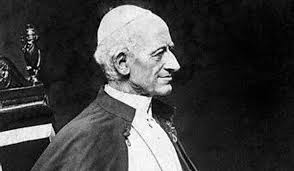It’s cliché (and a distinctly patronizing one), to say: You aren’t getting older; you’re getting better. But there’s more than a little truth about it. As the writer of the book of Job asks: “Is not wisdom found among the aged? Does not long life bring understanding?” (Job: 12:12)
Growing old is difficult, and it’s misguided to idealize it by assuming old age always yields wisdom. But by the same token, old age mustn’t be seen intrinsically as a period of barrenness and decline.
After all, like some wines that improve with age, not only do God’s servants gain wisdom over time, but often it isn’t until they’re downright elderly that they may reach their greatest achievements – think of Abraham, Sarah, Moses, Elizabeth, Zechariah, and others – including Cardinal Vincenzo Gioacchino Pecci.
Pecci was 68 years old when he became Pope Leo XIII in 1878. Given his advanced age and frail health, many assumed he would be a stopgap pope until a younger man could be put in place. Instead, he became the oldest pope in Church history and enjoyed the third-longest period in office. During those years, he established himself as a tireless reformer up to his death at age 93.
In Protestant England, Leo XIII is best remembered for astutely appointing the 78-year-old priest-theologian-poet, John Henry Newman, as a cardinal in 1878. Newman’s Cardinalate won wide approval in Britain and helped to lessen lingering anti-Catholic feelings.
London’s strongly establishment Financial Times has suggested that Newman was Britain’s leading religious thinker and writer of the last two centuries. No small praise, considering that Britain has produced numerous intellectual giants in modern times. But also to the point, putting Newman forward was a neat piece of international diplomacy on the part of sage old Leo XIII.
Thereby hangs a lesson. As Pope Francis has said repeatedly, the elderly are a rich natural human resource with a vital part to play in any community. Their lives should brim with opportunities to serve others. Old age need not be sterile. It should be a life-capping phase when masters, not apprentices, are encouraged to serve. As Leo XIII’s life shows, God doesn’t pension people off once they reach 66. Why should we?
We may have to seek out useful activities for our seniors. But by seeking, surely we’ll find. St. Paul, St. Augustine, St. Jerome, Julian of Norwich, Saint Katharine Drexel, and countless others worked into their seventies, eighties, nineties and beyond.
Older people aren’t inherently better than the young. Consider men such as Nicholas Morrison, 22, who is on his way to study for the priesthood next year in Rome. He’s one of a new breed of so-called millennial priests, “The God Squad,” which was recently highlighted in Time. These charismatic young men have set their sights on presenting the world with a fresh look at another young, radical thirty-something religious figure: Jesus Christ.
The young have idealism and virtue and high-octane energy, they only lack the wisdom that comes from experience. A good idea, then, might be to forge partnerships between young and old. It has worked in the past: Eli and Samuel, Ruth and Naomi, Paul and Timothy.
Yet these days thousands of aging men and women are pensioned off at the peak of their potential. Someone or something seems to have convinced them that their juniors alone are better suited to carry on the work of the Church, the wider community, and the nation – and this at a time when all three need all the energy and wisdom they can get.
It’s one thing to want to retire, but many older folks are actually forced out, despite the Age Discrimination in Employment Act (ADEA). There are countless instances of age-discrimination in every social sector, from higher education to the corporate sector, where it appears that young is good and old is bad.
But ageism is like a soccer own-goal. The President Emeritus of the American Council of Learned Societies, Dr. Francis Oakley claims the distinction between the productivity of mature and younger workers is negligible. Reputable studies bear this out. He adds that what the elderly may lack in stamina, they make up for in experience.
I wouldn’t have wanted to be pontiff in Leo XIII’s day. Catholic conspiracy theories abounded about the pope’s plans to take over governments and put them under his authority. Leo XIII gradually helped to change anti-Catholic attitudes by his various efforts – written and diplomatic – in support of all governments that promote a legitimate social order.
Leo XIII rejuvenated the moribund diplomatic relations existing between the Vatican and many countries – not least by his encouraging a Catholic ralliement to the French Republic, by which he sought to distinguish between the need to resist militant secularism and the proper support of a popular government. (A distinction that still holds no little relevance.)
Examples like these show that no one can predict what the elderly are capable of doing. One thing is sure, though. If elderly people like Leo XIII are given no opportunity, then their experience, wisdom, and potential simply won’t matter.














